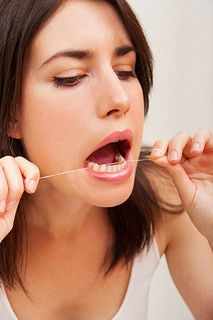April 5th, 2016

Whether it’s a dull and throbbing ache or a sharp pain, toothaches can come in many different forms. Chances are you’ve had the discomforting experience once or twice in your life. It’s the type of experience that nobody wants to have, because a toothache can be as annoying as fingernails scratching a chalkboard.
What’s a good way to describe a toothache? Let’s see … your mouth feels as if it’s being besieged by one of those Loony Tunes-style jackhammers. As fate would have it, toothaches always seem to occur over the weekend or after-office hours, leaving you to suffer and forcing you to cancel your reservation at that high-end restaurant you’ve been anticipating all week.
Not so fast!
While you’re probably going to want to skip the rib-eye steak, there are numerous tried-and-true home remedies you can use to ease the pain until you can make an appointment with our office. Here’s a look at four ways to soothe a toothache.
- Don’t underestimate the power of salt water. Rinsing your mouth with warm salt water will both soothe your toothache and disinfect your mouth. However, make sure the water is warm; cold water can further exacerbate a sensitive tooth. Follow up the saltwater rinse by swishing your mouth with hydrogen peroxide.
- Clove oil, eucalyptus oil, peppermint oil, and vanilla extract are proven to be comforting elixirs. Dip a cotton swab in one of these mixtures and apply it to your tooth and gums. These substances, which you may even have in your kitchen cupboards, are known to have pain-relieving qualities. For the best results, repeat the application throughout the day.
- Eating yogurt is good for toothaches and mouth pain. Yogurt is filled with healthy bacteria that combat pain. Afterward, place a cold compress on your jaw.
- Try flossing. Your toothache might be throbbing and severe, but there’s always a chance the pain is caused by a piece of food awkwardly lodged in your teeth.
We hope that helps! Give Gary Yanowitz, DDS a call to learn more!
March 29th, 2016

Spilling soda on someone’s white shirt, telling an off-color joke at an inappropriate time, or sneezing chewed food all over the dinner table all pale in comparison to the socially unacceptable, embarrassing blunder of having ... bad breath!
Five Possible Causes of Halitosis
- Poor oral hygiene practices. Failing to brush your teeth encourages anaerobic bacteria growth, which involves a type of bacteria that emits volatile sulfur compounds (gases) responsible for smelly breath.
- If you have tonsils, you may have tonsil stones embedded in the fissures of your tonsils. Tonsil stones are hard, tiny pieces of bacteria, dead oral tissue, and mucus that form inside tonsil crevices. When accidentally chewed, they release extremely foul odors that others can smell and you can actually taste.
- You have a chronically dry mouth due to medications, allergies, or persistent sinus conditions that force you to breathe through your mouth. Anaerobic bacteria thrive in dry, stagnant environments where oxygen content is minimal. Consequently, a dry mouth tends to lead to smelly breath.
- You have acid indigestion or GERD (gastroesophageal reflux disease). If you constantly belch stomach gases, this not only causes your breath to smell fetid but it can lead to enamel erosion and tooth decay.
- You have one or more oral diseases: gingivitis, periodontitis, or infections in the gums known as abscesses.
Improving oral hygiene practices may eliminate bad breath, but if brushing, flossing, and rinsing with a fluoride mouthwash twice a day doesn’t stop people from backing away from you when you open your mouth, it’s time to visit Gary Yanowitz, DDS.
March 22nd, 2016

If you are unhappy with the color of your teeth, teeth whitening may be an excellent choice for you. Many patients of Dr. Gary Yanowitz suffer from darkened teeth due to the natural aging process, regular consumption of coffee or tea, or nicotine staining from cigarettes.
Some people may have darkened teeth due to long-term use of medication. Certain medication-related stains on the teeth cannot be lightened, but virtually every other type of teeth stains can be effectively lightened using either professional dental whitening or at-home whitening.
While both types of whitening have benefits, at-home kits are less expensive and less effective overall. Professional teeth whitening is a highly effective option, but it requires a bit more of an investment. Here is the basic info on each type of whitening.
At-Home Whitening
At-home whitening is done in a number of different ways today. Some of the most popular options include:
- Whitening strips that are applied to teeth and then removed after a specified period. These will typically be used once a day for at least a week.
- Whitening gels or pastes that are placed in a one-size-fits-all plastic tray. These trays are worn, retainer style, for a set period of time once a day.
- Whitening toothpaste, which is used daily, and whitening mouthwashes are also available today. These products require constant use to realize results.
In-Office Whitening
In-office whitening is the fastest way to achieve whiter teeth. If you want an almost immediate difference in the color of your teeth and their overall appearance, this is probably the option for you.
Dr. Gary Yanowitz will typically apply the whitening formula directly to your teeth. Following the application, we will have you relax in our office between half an hour and an hour.
Some office-whitening formulas are strengthened with the use of heat, specialized lighting, or laser application. Patients will usually notice whitening results after only one application, but it usually takes at least a few appointments at Gary Yanowitz, DDS to notice a truly dramatic change in tooth color.
March 15th, 2016

On March 17, everyone has a little Irish in them. St. Patrick’s Day is a joyous celebration of Irish heritage. The holiday originated as a commemoration of Saint Patrick, who brought Christianity to Ireland. The saint arrived in Ireland in 432 and earned the reputation of a champion of Irish Christianity. March 17th, the day of St. Patrick’s death, has been commemorated by the Irish for over 1,000 years. St. Patrick’s Day is still observed as a religious feast day by several Christian denominations, but it is better known in the public imagination as a rich celebration of Irish culture.
St. Patrick’s Day has been an official public holiday in Ireland since 1903. Each year, the Irish celebrate with a several-day festival that includes theater performances, music, fireworks, and festive parades. The celebration is also a public holiday in Northern Ireland, Montserrat, and Newfoundland and Labrador. In other parts of the world with heavy Irish populations, it is an unofficial celebration of Irish heritage. Parts of Great Britain, Canada, Argentina, South Korea, Switzerland, New Zealand, the United States, and Australia commemorate the holiday each year. Typical celebrations in these countries include drinking green beer, wearing green, eating traditional Irish foods, parades, and shamrock decorations.
Many people, Irish and non-Irish alike, take part in the “wearing of the green” on St. Patrick’s Day. In fact, the color originally associated with Saint Patrick was blue. His use of shamrocks to explain the Holy Trinity to the Irish made the green clover emblematic of the holiday, leading to the traditional green attire worn by thousands on St. Patrick’s Day. Other little-known facts about St. Patrick’s Day include the following:
- Each year, the United States and Ireland face off in a rugby competition called the “St. Patrick’s Day Test.”
- Montreal celebrates the holiday with an annual parade, which has been held each year since 1824. The Montreal city flag even features a shamrock in its corner, as a nod to its Irish heritage.
- The Guinness World Records named St. Patrick’s Day the “Friendliest Day of the Year.”
- Along with Valentine’s Day, St. Patrick’s Day is one of the most widely celebrated saint’s day in the world.
No matter your cultural heritage, St. Patrick’s Day is a great time to let loose and celebrate your inner Irish-ness! Don your greenest attire and exclaim “Erin go Bragh!” (Ireland forever!) to everyone you meet. From Dr. Gary Yanowitz - have a great St. Paddy’s day!




